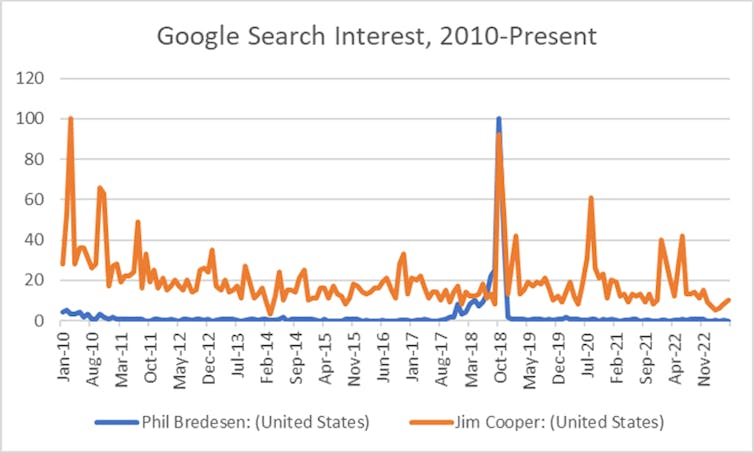The Taylor Swift Official State Sandwich: Politicians understand that Swifties are a key demographic
Pittsburgh’s mayor renamed the city ‘Swiftsburgh’ when the singer’s tour hit town. He’s not the only politician publicly fawning over the star.

Like any millennial pop music fan active on social media, I’ve been following Taylor Swift’s Eras Tour – the surprise songs, the scramble to get tickets, her brief romance with that guy from The 1975 with a history of racist comments.
But as a political scientist, I was intrigued by something else: reaction to the tour by government officials. New Jersey renamed the state’s famed Taylor ham, egg and cheese in her honor – it’s now the “Taylor Swift Ham, Egg, and Cheese” official state sandwich.
Pittsburgh’s mayor briefly renamed the city “Swiftsburgh” when her tour hit town.
And in my neck of the woods, Swift Street in North Kansas City was temporarily rebranded “Swift Street (Taylor’s Version).”
Local or state governments have lauded Swift in some way at virtually every stop on her tour. While these honors make for great photo opportunities for Swifties, the politics of these moves is worth examining. Do politicians have something to gain in appealing to Swift’s fans?
Celebrities can help politicians
Unlike many celebrities, Swift does not involve herself much in politics. One particular tool of politicians looking to boost their numbers is to get celebrity endorsements. But Swift’s use of endorsements has been limited, save for backing two Democrats in her adopted home state of Tennessee: Phil Bredesen in his Senate race and U.S. Rep. Jim Cooper in his 2018 reelection campaign. Swift also endorsed Joe Biden in 2020.
Bredesen’s peak in Google search interest from 2010 to the present coincided with Swift’s endorsement in October 2018. Cooper saw more Google search traffic with Swift’s endorsement than at any point since his vote for the Patient Protection and Affordable Care Act in March 2010.

While the specific impact of Swift’s endorsements is difficult to assess, an Emerson College poll of Tennesseans in 2018 found that 11.7% of those surveyed said Swift’s endorsement would make them more likely to support Bredesen – a number unlikely to make a difference in a race Bredesen lost by nearly 11 points despite Swift’s support. Cooper easily won reelection in his heavily Democratic Nashville-based district.
Although Swift’s endorsements likely did not sway these particular races, celebrity endorsements can matter in close races, particularly when the celebrity making the endorsement is viewed favorably – a likely scenario in Swift’s case.
Fawning = attention
A slight majority of Americans consider themselves at least something of a fan of Swift’s music – that includes me – and a June 2023 Echelon Insights poll showed 50% of likely voters view Swift at least somewhat favorably. This is a higher favorability rating than Joe Biden, Donald Trump and both major political parties.
We’re not talking about endorsements here, though – we’re talking about politicians aligning themselves with Swift with no reciprocity. One clear benefit to public officials fawning over Swift? Attention – not unlike that seen for Bredesen and Cooper in 2018.
New Jersey Gov. Phil Murphy’s tweet declaring the “Taylor Swift ham, egg, and cheese” garnered 5,700 likes; his next unrelated tweet had fewer than 100.
A cursory analysis of social media data seems to support the idea that the use of Swift’s name in honorary government actions produces a result similar to that of Swift’s endorsements: it drives engagement. Murphy’s Instagram post lauding Swift garnered the most likes on any post of his in 2023, with the exception of an early June post on the state’s air-quality crisis.
OK, so politicians need publicity, and they can use Taylor Swift’s name to get it. But what about Swifties as a voting bloc?
The idea that Swifties might be a key demographic in future elections is not far-fetched given their location and age. A majority of Swift’s fans live in the suburbs, the swing territory of American politics. Further, most are Gen Zers or Millennials. These groups encompass an increasing share of the electorate with each passing year – up to 31% in 2020. Swift’s favorability among those ages 18 to 29 stands at 72%, and by one poll’s estimate, 21% in that age cohort say they would vote for Swift over Trump and Biden.
Taylor Swift Post Office?
World leaders from numerous countries have taken to social media to ask Swift to bring her tour to their countries. There’s an economic angle to this, of course, as a Swift tour stop can generate huge sums in consumer spending. In the U.S., however, the honorifics bestowed upon Swift have come since her tour dates were confirmed.
There is a question of whether these Swift-adjacent stunts boil down to campaigning thinly disguised as official government action. This is perhaps best demonstrated in Canada, where a member of Parliament filed a parliamentary grievance over the singer’s lack of Canadian tour dates.
Such behavior is perhaps analogous to, on a larger scale, the renaming of post offices in the U.S. Congress. While generally innocuous and locally meaningful, these moves still require government resources and staffers to put their attention toward them as opposed to substantive policy matters.
Taylor Swift is an enormously popular figure, particularly among demographic groups that will be increasingly important in future American elections. In close races, voices such as Swift’s could prove critical – not necessarily because she influences how fans vote, but because her voice provides attention and credibility to candidates.
Matt Harris does not work for, consult, own shares in or receive funding from any company or organization that would benefit from this article, and has disclosed no relevant affiliations beyond their academic appointment.
Read These Next
AI’s growing appetite for power is putting Pennsylvania’s aging electricity grid to the test
As AI data centers are added to Pennsylvania’s existing infrastructure, they bring the promise of…
Why US third parties perform best in the Northeast
Many Americans are unhappy with the two major parties but seldom support alternatives. New England is…
Abortion laws show that public policy doesn’t always line up with public opinion
Polls indicate majority support for abortion rights in most states, but laws differ greatly between…





